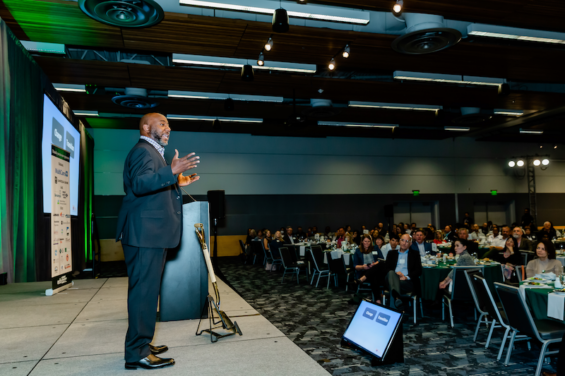Jahmad Canley: Beliefs and leadership

A lot has changed over the last few years, and companies are looking for ways to move forward. Who better to offer guidance than Tacoma’s own Jahmad Canley, CEO and Senior Consultant for Potential Unleashed?
Canley’s interactive and thought-provoking keynote address at the EDB’s 2023 Annual Meeting offered practical advice on what leaders can do to facilitate change in their organizations.
Change + transition = success
Change is a constant. The question is, when something changes, how will you transition?
Canley asked meeting attendees to view change like this:
- It happens first
- It’s fast
- It’s caused by external circumstances
- It happens with or without our permission
A global pandemic certainly fits the bill.
Transition, on the other hand, comes after change. It takes more time, happens internally and can only occur with our permission.
The power of beliefs
From fear to mistrust to internal politics, there are a range of characteristics within an organization that can limit its potential for successful change and transition. Those characteristics fall into four categories that every individual in every organization has: Habits, Attitudes, Beliefs and Expectations – or HABEs.
Most of the time, we developed our current HABES because at some point they served us well. But when the environment begins to change, our HABES might be holding us back. It may be time do things differently.
Of the four HABES, research shows that beliefs are the most powerful. “If you believe something to be true (or not), it controls your life, actions and behaviors,” Canley said. Here’s why:
- Most habits are developed because we believe they will be positive or beneficial.
- Attitude is the emotional response to a belief.
- Expectations are beliefs forecast into the future.
Beliefs convert to behaviors; behaviors convert to results, Canley said. “Leaders spend their time and effort – for good reason – focused on results and behavior. And I’ve watched them get burned out.”
Canley asked meeting attendees to shift their time and focus and think of one belief they want every employee in their organization to have and think strategically about how to facilitate that.
“We can’t change beliefs, but we can help facilitate cultures and environments to help people start to shift their own beliefs towards ones we know are constructive for us.”